2018
Continued high levels of achievement in AP* math, science, and English courses saluted; AP-TIP IN program grows as Notre Dame supports teachers and students statewide
Number of Advanced Placement students continues to grow under AP-TIP IN
SOUTH BEND, IN – November 5, 2018 – AP-TIP IN is elated to report continued gains in the sixth year of its program designed to increase the number of high school students earning college credit from their successes in Advanced Placement* math, science, and English courses.
After completing six years in the program, participants demonstrated that the innovative model developed by the National Math and Science Initiative (NMSI) dramatically increases preparation and performance in the AP math, science, and English (MSE) tests. Students and teachers in the following 15 public high schools and 1 private high school continued their successful efforts supporting college- and career-readiness during the 2017-18 school year:
- Argos Jr.-Sr. High School
- Avon High School
- Clay High School
- Clinton Central Jr. Sr. High School
- Griffith High School
- Lowell High School
- Marion High School
- Merrillville High School
- Michigan City High School
- Mooresville High School
- Muncie Central High School
- New Albany High School
- Northwestern High School
- Providence Cristo Rey High School
- Twin Lakes High School
- Washington High School
More than 765 students in these schools achieved a score of 3, 4, or 5 on 949 AP MSE tests, thereby becoming eligible for college credit for those college courses. (Many students took more than one AP test.)
After two years of participating in AP-TIP IN, the number of participating schools’ AP qualifying MSE scores (scores of 3, 4, or 5 that earn college credit) increased by 82 percent. This increase reflects the success of the AP-TIP IN and NMSI model of preparing both students and teachers for mastery of advanced subject matter, and increased access to and enrollment in, designated AP courses.
Minority students at Cohort 4 and 5 schools, particularly African American and Hispanic students, experienced great gains in the number of students taking MSE AP courses as the number of enrollments grew 48 percent compared to the “baseline” year. Additionally, enrollment in AP math and science courses for African American and Hispanic students increased by an average of 80 percent in the same time frame.
Female students from Cohort 4 and 5 schools made similar gains in math and science qualifying scores with an increase of 61 percent. Such strides among these key underrepresented groups prove that students, when provided the opportunity and support, can close the achievement gap as they become STEM-literate and geared for college success.
The NMSI model combines training and incentives for students and educators who want to take their high school expectations to the next level. Through the AP-TIP IN program, which is administered for Indiana by the University of Notre Dame’s Institute for Educational Initiatives, participating public schools cooperate in year-round initiatives. These include extensive training of teachers, additional time-on-task for students through tutoring and exam preparation, and financial incentives for students and teachers when testing yields the qualifying scores.
After six years of implementation, more than 21,000 students at AP-TIP IN schools took over 30,600 AP math, science and English courses. Increasing enrollments and access to AP math, science, and English courses is a goal of this program; and this practice opens doors to college success among all participants. Of those 21,000 students, over 7,000 earned more than 12,000 qualifying scores in AP math, science and English courses. This translates to a savings in college credit for Indiana families of approximately $10 million.
AP-TIP IN acknowledges the successes of its teachers and schools by awarding AP-TIP IN
Teachers of the Year in the areas of Math, Science and English, and a School of the Year. |
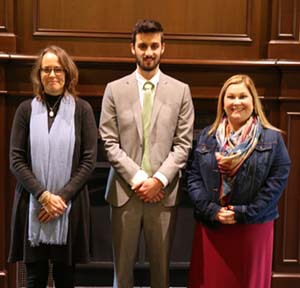 AP-TIP IN English Teacher of the Year Finalists
AP-TIP IN English Teacher of the Year Finalists
Maia Hawthorne – AP English Language and AP English Literature – Twin Lakes High School
Carter McClure – AP English Language – Muncie Central High School
Melissa Sickinger – AP English Language – Merrillville High School
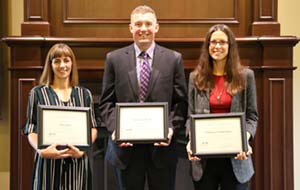
AP-TIP IN Math Teacher of the Year Finalists
Jonathan Arndt – AP Calculus AB – Argos Junior-Senior High School
Dana Bell – AP Statistics – Lowell High School
Christine Chidichimo – AP Calculus AB and AP Calculus BC – Griffith High School
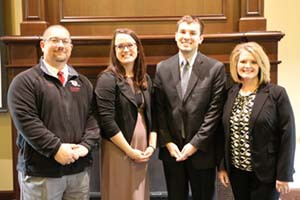
AP-TIP IN Science Teacher of the Year Finalists
Kathleen Kozinski – AP Chemistry – Avon High School
Matthew Payne – AP Chemistry – Avon High School
Clark Mumaw – AP Chemistry – New Albany High School
Kristi Phillippe – AP Biology – Marion High School
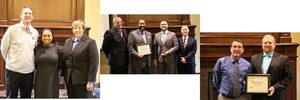
AP-TIP IN Affiliate School of the Year Finalists
Pike High School – Indianapolis, Indiana
Speedway High School – Speedway, Indiana
Whiteland Community High School – Whiteland, Indiana
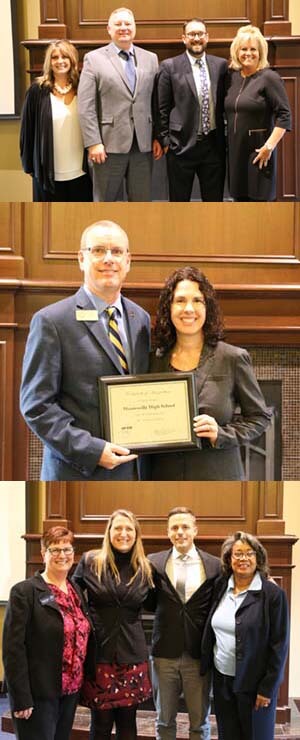
AP-TIP IN School of the Year FINALISTS
Lowell High School – Lowell, Indiana
Michigan City High School – Michigan City, Indiana
Mooresville High School – Mooresville, Indiana
Thank you to our supporters
Lilly Endowment, Inc. for Cohort Schools from 2016 to 2020
Community Foundation of St. Joseph County, for Washington High School from 2016 to 2019
Indiana Commission for Higher Education for Cohorts 4 and 5 from 2017 to 2018
2017
Number of Indiana High School Students Taking Advanced Placement Courses Continue to Grow Under AP-TIP IN
Continued high levels of achievement in AP* math, science, and English courses saluted; AP-TIP IN program grows as Notre Dame supports teachers and students statewide
SOUTH BEND, IN – October 6, 2017 – AP-TIP IN is elated to report continued gains in the fifth year of its program designed to increase the number of high school students earning college credit from their successes in Advanced Placement* math, science, and English courses.
After completing five years in the program, participants demonstrated that the innovative model developed by the National Math and Science Initiative (NMSI) dramatically increases preparation and performance in the AP math, science, and English (MSE) tests. Students and teachers in the following 19 public high schools continued their successful efforts supporting college- and career-readiness during the 2016-17 school year:
- Argos High School
- Arsenal Tech High School
- Broad Ripple High School
- Clark High School
- Clinton Prairie High School
- Crispus Attucks High School
- Eastern Greene High School
- Edgewood High School
- Griffith High School
- Lowell High School
- Merrillville High School
- Mooresville High School
- Morton High School
- Lebanon High School
- New Prairie High School
- Northwestern High School
- Twin Lakes High School
- Washington High School
- Whitko High School
More than 760 students in these schools achieved a score of 3, 4, or 5 on nearly 1,990 AP MSE tests, thereby becoming eligible for college credit for those college courses. (Many students took more than one AP test.)
In their first year of participating in AP-TIP IN, the number of participating schools’ AP qualifying MSE scores (scores of 3, 4, or 5 that earn college credit) increased by 87 percent. This increase reflects the success of the AP-TIP IN and NMSI model of preparing both students and teachers for mastery of advanced subject matter, and increased access to and enrollment in, designated AP courses.
Minority students at Cohort 3 and 4 schools, particularly African American and Hispanic students, experienced great gains in the number of students taking MSE AP courses as the number of enrollments grew 28 percent compared to the “baseline” year. Additionally, enrollment in AP math and science courses for African American and Hispanic students increased by an average of 31 percent in the same time frame.
Female students from Cohort 3 and 4 schools made similar gains in math and science qualifying scores with an increase of 151 percent. Such strides among these key underrepresented groups prove that students, when provided the opportunity and support, can close the achievement gap as they become STEM-literate and geared for college success.
The NMSI model combines training and incentives for students and educators who want to take their high school expectations to the next level. Through the AP-TIP IN program, which is administered for Indiana by the University of Notre Dame’s Institute for Educational Initiatives, participating public schools cooperate in year-round initiatives. These include extensive training of teachers, additional time-on-task for students through tutoring and exam preparation, and financial incentives for students and teachers when testing yields the qualifying scores.
After five years of implementation, more than 19,000 students at AP-TIP IN schools took over 28,000 AP math, science and English courses. Increasing enrollments and access to AP math, science, and English courses is a goal of this program; and this practice opens doors to college success among all participants. Of those 19,000 students, over 7,000 earned more than 11,000 qualifying scores in AP math, science and English courses. This translates to a savings in college credit for Indiana families of approximately $8.6 million.
AP-TIP IN acknowledges the successes of its teachers and schools by awarding AP-TIP IN Teachers of the Year in the areas of Math, Science and English, and a School of the Year. The Finalists are:
AP-TIP IN English Teacher of the Year FINALISTS:
- Chris Jagadich – AP English Language – Morton High School
- Amy Miller – AP English Language – Northwestern High School
- Nancy VanAllen – AP English Language – Edgewood High School
AP-TIP IN Math Teacher of the Year FINALISTS:
- Jonathan Arndt – AP Calculus AB – Argos Junior-Senior High School
- Dana Bell – AP Statistics – Lowell High School
- Marilyn Brunk – AP Computer Science Principles – Griffith High School
AP-TIP IN Science Teacher of the Year FINALISTS:
- Martin Barker – AP Biology – Broad Ripple High School
- Mike Dollens – AP Chemistry and AP Physics I – Lebanon High School
- Jeff Layden – AP Biology – Northwestern High School
- Angie Smith – AP Biology – New Prairie High School
AP-TIP IN School of the Year FINALISTS:
- Argos Junior-Senior High School – Argos, Indiana
- Griffith High School – Griffith, Indiana
- Lebanon High School – Lebanon, Indiana
- Northwestern High School – Kokomo, Indiana
2016
More than 1,700 Indiana high school students earn "Advanced Placement" successes
Continued high levels of achievement in AP* math, science, and English courses will be saluted; “AP-TIP IN” program grows as Notre Dame supports teachers and students statewide
SOUTH BEND, IN – October 7, 2016 – AP-TIP IN is elated to report continued gains in the fourth year of its program designed to increase the number of high school students earning college credit from their successes in Advanced Placement* math, science, and English courses.
After completing three years in the program, participants demonstrated that the innovative model developed by the National Math and Science Initiative (NMSI) dramatically increases preparation and performance in the AP math, science, and English (MSE) tests. Students and teachers in the following 21 public high schools continued their successful efforts supporting college- and career-readiness during the 2015-2016 school year:
- Arsenal Tech High School
- Ben Davis High School
- Broad Ripple High School
- Clark High School
- Crawford County High School
- Crispus Attucks Medical Magnet School
- Eastern Green High School
- Edgewood High School
- Gavit High School
- Hammond High School
- Kokomo High School
- Lake Central High School
- Lawrence Central High School
- Lawrence North High School
- Lebanon High School
- Morton High School
- New Prairie High School
- Richmond High School
- Westfield High School
- Whiteland High School
- Whitko High School
More than 1,700 students in these schools achieved a score of 3, 4, or 5 on nearly 2,670 AP MSE tests, thereby becoming eligible for college credit for those college courses. (Many students took more than one AP test.)
In their first year of participating in AP-TIP IN, participating schools’ AP MSE scores increased by an average of 57%! This increase reflects the success of the AP-TIP IN and NMSI model of preparing both students and teachers for mastery of advanced subject matter, and increased access to and enrollment in, designated AP courses.
Minority students at Cohort 2 and 3 schools, particularly African American and Hispanic students, experienced great gains in the number of college-level scores for MSE AP exams as the number of qualifying scores (scores of 3, 4, or 5 that earn college credit) nearly doubled compared to the “baseline” year. Additionally, success on AP math and science exams for African American and Hispanic students increased by an average of 154% in the same time frame.
Female students from Cohort 2 and 3 schools made similar gains in math and science qualifying scores with an increase of 152%. Such strides among these key underrepresented groups prove that students, when provided the opportunity and support, can close the achievement gap as they become STEM-literate and geared for college success.
The NMSI model combines training and incentives for students and educators who want to take their high school expectations to the next level. Through the AP-TIP IN program, which is administered for Indiana by the University of Notre Dame’s Institute for Educational Initiatives, participating public schools cooperate in year-round initiatives. These include extensive training of teachers, additional time-on-task for students through tutoring and exam preparation, and financial incentives for students and teachers when testing yields the qualifying scores.
After four years of implementation, more than 17,000 students at AP-TIP IN schools took over 25,300 AP math, science, and English courses. Increasing enrollments and access to AP math, science, and English courses is a goal of this program; and this practice opens doors to college success among all participants. Of those 12,000 students, over 6,500 earned more than 10,000 qualifying scores in AP math, science and English courses. This translates to a savings in college credit for Indiana families of approximately $8,000,000!
AP-TIP IN acknowledges the successes of its teachers and schools by awarding AP-TIP IN Teachers of the Year in the areas of Math, Science and English, and a School of the Year. The finalists for these awards were announced at the AP-TIP IN Fall Conference on Friday, September 23, 2016. The Finalists are:
AP-TIP IN English Teacher of the Year FINALISTS:
- Angela Coddington - AP English Language - Lebanon High School
- Linus Peck - AP English Literature - Lawrence Central High School
- Chrystal Wilkeson - AP English Language & AP English Literature - New Prairie High School
AP-TIP IN Math Teacher of the Year FINALISTS:
- Pavel Abramov - AP Statistics - Eastern Greene High School
- Timothy Fish - AP Calculus BC - Whiteland High School
- Rebecca Hufty - AP Calculus AB and BC - Lawrence North High School
AP-TIP IN Science Teacher of the Year FINALISTS:
- Jason Bousman - AP Environmental Science - Westfield High School
- Kevin Morse - AP Chemistry - Westfield High School
- Dustin Verpooten - AP Biology - Lake Central High School
AP-TIP IN School of the Year FINALISTS:
- Edgewood High School
- Lake Central High School
- Westfield High School
- Whitko High School





















